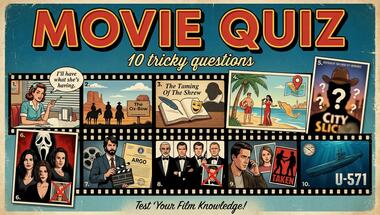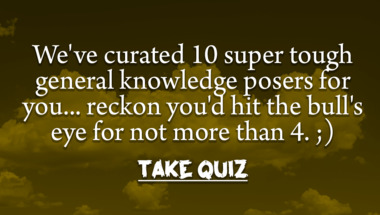
History Quiz (Super Hard)
Difficulty : Medium-Hard Get 5/10 correct to pass the quiz
Question 1 of 10
What is the surname of the former U.S. Presidential candidate who has the first name Mitt ...
Question 2 of 10
In the land of pretzels, schnitzels, and lederhosen, which European country is the birthplace of the famed Brothers Grimm and their enchanting collection of fairy tales?

Advertisement
Question 3 of 10
In the 1950s there was a huge rise in the production of what after World War II?
Question 4 of 10
Who was the object of John Hinckley's infatuation, the man who notoriously attempted to win her heart through the unconventional and ill-advised method of trying to assassinate President Reagan?

Question 5 of 10
Hu Yaobang was leader of which country in the '80s?
Question 6 of 10
What was former FBI agent Robert Hanssen convicted of in 2001?
Question 7 of 10
What was the name of Theodore Roosevelt's second Secretary of War?
Advertisement
Question 8 of 10
The New York stock exchange was founded in which century?
Question 9 of 10
The British parliament abolished the slave trade in which century?
Question 10 of 10
In which century BC did the Athenians suffer a great plague?
Advertisement

MORE QUIZZES
1960s song quiz
10 questions
10 questions

Geography Quiz (Super Hard)
Can you score 5 or higher?
Can you score 5 or higher?

General Trivia Quiz
How many correct will you get?
How many correct will you get?

1970s Lyrics Quiz
How many correct answers will you get?
How many correct answers will you get?

Difficult mixed trivia quiz
Do you know enough to earn yourself a high fi..
Do you know enough to earn yourself a high fi..

Quiz : Latin Words
If you know more than 3 of these 10 words, we..
If you know more than 3 of these 10 words, we..

Quiz on History
Here are 10 questions to assess your level of..
Here are 10 questions to assess your level of..

History Quiz
10 questions to answer
10 questions to answer

Latin Words Quiz
10 questions
10 questions

Advertisement
10-Question Culinary Challen
How many right answers can you score?
How many right answers can you score?

Spelling Quiz
How many correct will you get?
How many correct will you get?

Science Trivia Quiz
10 questions to test your knowledge
10 questions to test your knowledge

10 trivia questions for smar
How high will you score?
How high will you score?

Trivia quiz suitable for all
Test your intelligence with this quiz!
Test your intelligence with this quiz!

Food & Cooking Quiz
10 questions
10 questions

Food Quiz
10 questions
10 questions

60s Song Lyrics Quiz
10 songs, can you guess them all?
10 songs, can you guess them all?

Quiz : 1960s
Scoring a clean 10 will never happen
Scoring a clean 10 will never happen

Advertisement
Trivia Quiz : 10 Hard Questi
Can You Score 8 Out Of 10 Or Higher?
Can You Score 8 Out Of 10 Or Higher?

Mixed General Quiz
10 fun questions
10 fun questions

World Geography Quiz
10 questions
10 questions

Geography Quiz
10 mixed questions
10 mixed questions

Expert food quiz for top hom
Can you score higher than 6/10?
Can you score higher than 6/10?

Fun movie quiz
10 exciting questions
10 exciting questions

Movie Quiz
10 mixed questions
10 mixed questions

10-question fun fact challen
How many questions will you ace in this 10-qu..
How many questions will you ace in this 10-qu..

Science Quiz
How nerdy are you?
How nerdy are you?

Advertisement
Trivia quiz on World Geograp
10 enjoyable geography-related quiz questions
10 enjoyable geography-related quiz questions

Swingin’ Sixties Hits Chal
How many hits can you score in this 10-questi..
How many hits can you score in this 10-questi..

10 trivia questions in one q
And 10 more questions
And 10 more questions

Mixed Knowledge Quiz
How many of them will you answer correctly?
How many of them will you answer correctly?

Mixed knowledge questions
Tell us your result in the comments
Tell us your result in the comments

History quiz for geniuses
Are you smart enough for this history quiz?
Are you smart enough for this history quiz?

Quiz : Song Lyrics back in t
Let me know your score in the comments
Let me know your score in the comments

1960s Song Quiz
10 questions
10 questions

10 mixed categories question
Let's test your trivia skills!
Let's test your trivia skills!

Advertisement
10-question culinary challen
How many questions will you ace in this 10-ro..
How many questions will you ace in this 10-ro..

General trivia quiz
10 mixed questions
10 mixed questions

A trivia quiz for knowledge
Do you have it in you?
Do you have it in you?

Genius quiz
10 mixed questions
10 mixed questions

Geography Quiz
10 mixed questions
10 mixed questions

10-question fun facts challe
How many questions will you ace in this 10-qu..
How many questions will you ace in this 10-qu..

World History Quiz
10 questions to test your knowledge
10 questions to test your knowledge

Trivia Quiz for 60+
Ten amazing questions
Ten amazing questions

Trivia Quiz For You
How Will You Do?
How Will You Do?

Advertisement
Hard trivia quiz
We mixed up 10 good questions here
We mixed up 10 good questions here

Movie Quiz (10 questions)
How well do you know these movies?
How well do you know these movies?

Expert Trivia Quiz
Level : VERY HARD
Level : VERY HARD

Trivia Quiz : Scoring higher
Can you score 8/10?
Can you score 8/10?

Spelling & Words Quiz
10 mixed up questions
10 mixed up questions

A quiz about food & cooking
If you want, please tell us your score in the..
If you want, please tell us your score in the..

Trivia Quiz
How many of them will you answer correctly?
How many of them will you answer correctly?

World History Quiz
Tell us your result in the comments
Tell us your result in the comments

Quiz : Good Old Grandma Food
Post your score in the comments!
Post your score in the comments!

Advertisement
General trivia quiz
10 genius questions
10 genius questions

Trivia Test
10 questions in mixed categories
10 questions in mixed categories

10 Trivia Questions
How many of them will you answer correctly?
How many of them will you answer correctly?

Mixed Knowledge Quiz
How's your trivia brain doing?
How's your trivia brain doing?

Quiz : Jobs of the past
Do you remember them all? (easy)
Do you remember them all? (easy)

Spelling Quiz for people wit
How good are you at spelling?
How good are you at spelling?

10-question mixed knowledge
How many questions will you ace in this 10-qu..
How many questions will you ace in this 10-qu..

10 hard trivia questions
Mixed Knowledge quiz
Mixed Knowledge quiz

Blockbuster Challenge: 10-Qu
How many movies can you ace in this 10-questi..
How many movies can you ace in this 10-questi..

Advertisement
World History Trivia Quiz fo
10 mixed up history questions
10 mixed up history questions

Cinematic challenge: 10-ques
How many right answers can you score? (10-que..
How many right answers can you score? (10-que..

1960s Music Quiz (10 questio
Take the quiz, tell your score :)
Take the quiz, tell your score :)

General Knowledge Quiz (10 q
Mixed category quiz
Mixed category quiz

Quiz for people 50+
10 mixed questions
10 mixed questions

Science and nature quiz
10 questions
10 questions

Food/Cooking Quiz
10 tasty questions
10 tasty questions

Quiz : Leading roles in movi
How many of them will you answer correctly?
How many of them will you answer correctly?

General Trivia Quiz for the
10 easy to hard questions
10 easy to hard questions

Advertisement
10-question all-around knowl
How many questions will you ace in this 10-qu..
How many questions will you ace in this 10-qu..

Trivia quiz for smart people
10 trivia questions to test your knowledge
10 trivia questions to test your knowledge

1930s Quiz
10 History Questions
10 History Questions

10 hard history questions
Scoring a clean 10 will never happen
Scoring a clean 10 will never happen

General Trivia Quiz
10 questions
10 questions

Quiz : Songs of the 1960s
How many correct will you get?
How many correct will you get?

Trivia quiz for people who a
Expert questions for developed minds
Expert questions for developed minds

Science Quiz
How nerdy are you?
How nerdy are you?

1960s Song Lyrics Quiz
How many of the good old songs do you remembe..
How many of the good old songs do you remembe..

Advertisement
Back to school quiz
10 questions lined up
10 questions lined up

Einstein Meter Trivia Quiz
Let us know your score in the comments
Let us know your score in the comments

1960s Song Quiz
10 mixed questions
10 mixed questions

Trivia for high IQ participa
Let's see how smart you really are!
Let's see how smart you really are!

10 General Knowledge Questio
What do you know?
What do you know?

General Trivia Quiz
10 fun questions
10 fun questions

Swingin’ 60s Music Challen
How many tunes will you nail in this 10-quest..
How many tunes will you nail in this 10-quest..

World History Quiz
10
10

Geography Trivia Quiz
10 questions to test your knowledge
10 questions to test your knowledge

Advertisement
Fun Trivia Quiz For You
A fun trivia quiz with 10 questions
A fun trivia quiz with 10 questions

Movie Quote Quiz
Do you know all these movie quotes?
Do you know all these movie quotes?

HARD trivia quiz
Score above 4/10 to beat it
Score above 4/10 to beat it

Impossible Trivia Quiz For E
Only members of the intellectual elite will s..
Only members of the intellectual elite will s..

General Trivia Quiz
10 questions to answer
10 questions to answer

10 hard general trivia quest
How's your brain doing today?
How's your brain doing today?

Quiz : Latin names for our b
How many correct will you get?
How many correct will you get?

Car Quiz
10
10

Mixed Knowledge Quiz
Can you beat these 10 questions?
Can you beat these 10 questions?

Advertisement
Quiz : 1960s Movie Quotes
Take the quiz right here
Take the quiz right here

1960s Song Quiz
10 mixed questions
10 mixed questions

1970s Lyrics Quiz
10 mixed questions
10 mixed questions

Trivia quiz on general knowl
10 questions of mixed topics
10 questions of mixed topics

History Quiz (Super Hard)
Anything above 4 correct = you passed!
Anything above 4 correct = you passed!

Fun trivia quiz
How many correct will you get?
How many correct will you get?

Trivia Quiz : Genius Level
How many correct will you get?
How many correct will you get?

10 mixed general trivia ques
Trivia quiz
Trivia quiz

General trivia quiz
10 mixed questions
10 mixed questions

Advertisement
General Trivia Quiz
10 mixed questions
10 mixed questions

Time-travel challenge: 10-qu
How many questions will you ace in this 10-qu..
How many questions will you ace in this 10-qu..

1961 Song Quiz
10 questions to test your knowledge
10 questions to test your knowledge

Trivia quiz for people who a
10 fun and challenging questions
10 fun and challenging questions

10 hard general questions
How many correct answers will you get?
How many correct answers will you get?

History Quiz
10
10

History Quiz
10 questions to answer
10 questions to answer

The Ultimate Brain Test
10 rather difficult questions
10 rather difficult questions

Swingin’ Sixties Tunes Cha
How many can you nail in this 10-question mus..
How many can you nail in this 10-question mus..

Advertisement
World Geography Quiz
10 interesting questions
10 interesting questions

Trivia Quiz : 10 general kno
Are you up for a quiz?
Are you up for a quiz?

Movie Quiz
10 questions
10 questions
